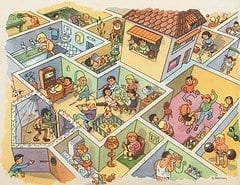
In Present Shock, media theorist Douglas Rushkoff argues that technology has delivered us to the future, and so it’s now time to use that technology to allow us focus on the present, instead of forcing us to constantly try to catch up.
“I’m a Presentist,” says Douglas Rushkoff. His new book, Present Shock, outlines a world where technological advancement has allowed us to live in real-time. The future–which used to be a destination that we marched toward–has arrived. Now, says Rushkoff, we need not worry about the future at all, because we are living in a present that will continue forever. Now we must either accept that fact and use our new technology to create a happier, present-based society, or constantly fight against it, in a losing battle against an always-on, always-connected economy.
What happened to the future? Rushkoff says you can trace its death to the same roots as the financial crisis. “Futurism–the yearning toward an end–is a symptom of the industrial age that we’re leaving behind,” he says. “It’s happening because the industrial age economy is finally running out of steam. … Industrial age currency has an accelerating clock built into it and we’ve reached the limits of our ability if not to grow, then to accelerate our growth.”
A SOLID STATE ECONOMY
Think about what this has meant for the global economy. Rushkoff notes that we’ve often taken abstract economic concepts and elevated them above production of physical goods. “The main forms of innovation from American companies that we’ve seen over the last 10 or 20 years have been financial innovation, which is more about creating a new kind of derivative that can compress time but that doesn’t actually make anything.”
Whole economies are fueled by these abstractions, which means the economy doesn’t need to keep expanding physically. It’s moved path the metaphor of progress that has fueled our idea of the future. “The industrial age was about going forward; was about growth; was about building for the future; was about investing in something that was going to be bigger later,” he says. “That has ended up getting replaced by a much more steady state economy, one that’s biased more toward transaction and the velocity of money rather than expansion and the storage of money. The cultural bias and economic bias metaphor is shifting from hard drive to ram, from potential energy to kinetic energy.”
SOLVING 21ST CENTURY PROBLEMS
Visualizing a better future seems nothing but admirable, but Rushkoff argues that by assigning a linear paradigm to these issues, we’re limiting ourselves in the possibilities of solutions. “If we stop looking at politics like a book, with a beginning, middle, and end, and we start looking at it more like the Internet, with an ongoing approach to behavior–that’s what’s going to solve 21st-century problems,” he says. “Twentieth century problems could be won, they had bad guys that could be beaten. You could go to the moon and stick a flag in the ground. But 21st century problems don’t have clear end points. Global warming, terrorism, child starvation: these are chronic problems that we can’t address through victory, but rather through developing sustainable, real time models or behaviors. These are not things you win, they’re things you learn to deal with and abate.”
The Latest Bing News on:
Real time models or behaviors
- Watch: “Behavior Doesn’t Lie:” The Power of ML for Identity Threat Detection and Responseon April 25, 2024 at 8:54 am
Traditional security controls like MFA and PAM are bypassed easily by threat actors on a regular basis. Threat actors prefer breaking into organizations using legitimate credentials so they can ...
- Megan Thee Stallion & Roc Nation Sued Over Unpaid Wages & Alleged Backseat Sex Action By ‘Mean Girls’ Actress & Another Womanon April 24, 2024 at 1:24 am
Now facing Garcia’s suit for a variety of unspecified damages, Megan Thee Stallion is set to go out on the road this summer. The 31-date Hot Girl Summer Tour kicks off May 14 in Minneapolis and ends ...
- How to avoid turning into your parent? Just say ‘no’ to annoying behavior | Opinionon April 21, 2024 at 3:01 am
Just like those humorous TV insurance commercials, my real-life husband is turning into his father, or someone’s dad, in so many ways.
- Eerily realistic: Microsoft’s new AI model makes images talk, singon April 20, 2024 at 10:32 am
Microsoft has developed an artificial intelligence model that converts images of a person’s face and audio clips into a video with proper lip-syncing, facial expressions, and head movements. Developed ...
- Meta's newest AI-powered chatbots show off impressive features and bizarre behavioron April 19, 2024 at 3:40 am
CEO Mark Zuckerberg's newest AI-powered Meta AI agents started venturing into social media this week to engage with real people.
- Meta’s newest AI model beats some peers, but confuses Facebook userson April 18, 2024 at 9:31 am
Google, Meta Platforms and OpenAI, along with startups such as Anthropic, Cohere and France’s Mistral, have been churning out new AI language models and hoping to persuade customers they’ve got the ...
- A Step-by-Step Guide to Real-Time Pricingon April 18, 2024 at 3:57 am
Some companies are now applying machine-learning models to guide their ... product availability and customer behavior to recommend optimal prices in real time. The ability to use AI to change ...
- What Google’s New AI Fruit Fly Can Teach Us about Real Behavioron March 27, 2024 at 5:01 pm
The tiny fruit fly, one of the most popular model ... of real flies, Patterson says, without human intervention and without anyone “actually having explicitly programmed that behavior in.” ...
- AI tools trace the body's link between the brain and behavioron December 20, 2023 at 6:03 pm
The information can be used to recreate the behavior in a lab, where at the same time researchers can measure ... which is based on a model of the brain-body relationship, to a real mouse. Based on ...
- Consumer Behavioron February 16, 2023 at 10:25 am
Consumer behavior—or how people ... available “for a limited time” (either at all or at a lower price) creates a sense of scarcity. Scarcity—whether real or manufactured—increases ...
The Latest Google Headlines on:
Real time models or behaviors
[google_news title=”” keyword=”real time models or behaviors” num_posts=”10″ blurb_length=”0″ show_thumb=”left”] [/vc_column_text]The Latest Bing News on:
Present-based society
- Y-mAbs to Present at 2024 ASCO Annual Meetingon April 25, 2024 at 1:11 pm
Y-mAbs Therapeutics, Inc. (the “Company” or “Y-mAbs”) (Nasdaq: YMAB), a commercial-stage biopharmaceutical company focused on the development and commercialization of novel radioimmunotherapy and ...
- Enterome to Present Clinical Data on EO2463 in B-cell Lymphoma at the 2024 American Society of Clinical Oncology (ASCO) Annual Meetingon April 25, 2024 at 3:47 am
Enterome, a clinical-stage company developing first-in-class immunomodulatory drugs for solid and liquid malignancies and inflammatory diseases based on its unique Mimicry platform, today announced ...
- How Margaret Atwood and Lauren Groff Write About the Presenton April 24, 2024 at 2:07 pm
Authors Margaret Atwood and Lauren Groff agree: it can be more effective to write truthfully about the contemporary world by situating stories in the past or in the future. Both writers discussed ...
- Cue Biopharma to Present at the 2024 American Society of Clinical Oncology (ASCO) Annual Meetingon April 24, 2024 at 7:55 am
Cue Biopharma, Inc. (Nasdaq: CUE), a clinical-stage biopharmaceutical company developing a novel class of therapeutic biologics to selectively modulate disease-specific T cells, announced today that ...
- Be Biopharma to Present at the American Society of Gene and Cell Therapy (ASGCT) 27th Annual Meetingon April 23, 2024 at 6:00 am
Be Biopharma, Inc. ("Be Bio"), a company pioneering the development of engineered B Cell Medicines (BCMs), today announced that it will present at the American Society of Gene and Cell Therapy (ASGCT) ...
- Vesigen to Present New Preclinical Data on Engineered ARMMs Technology at 2024 ASGCT Annual Meetingon April 22, 2024 at 5:32 pm
Vesigen Therapeutics, Inc., a biotechnology company developing a novel non-viral delivery platform for gene editors, RNA, and protein-based therapeuti ...
- CRISPR Therapeutics to Present Oral Presentation at the American Society of Gene & Cell Therapy (ASGCT) 2024 Annual Meetingon April 22, 2024 at 1:30 pm
ZUG, Switzerland and BOSTON, April 22, 2024 (GLOBE NEWSWIRE) -- (Nasdaq: CRSP), a biopharmaceutical company focused on creating transformative gene-based medicines for serious diseases, today ...
- Lake County Genealogical Society to hear from expert researcheron April 20, 2024 at 3:16 am
The Lake County Genealogical Society will be meeting via Zoom at 10 a.m. April 25. Anyone who is working on their family tree or is interested in historical and genealogical research is invited to ...
- Philharmonic Society & Irvine Barclay Theatre Present BACH MEETS BLUEGRASSon April 18, 2024 at 3:23 pm
Join the Philharmonic Society of Orange County and Irvine Barclay Theatre for a unique musical experience as Grammy-nominated violinist Tessa Lark and composer Michael Thurber present 'Bach Meets ...
- Biomica to Present at the American Society of Clinical Oncology (ASCO) 2024 Annual Meetingon April 15, 2024 at 8:59 pm
About Biomica Ltd.: Biomica is a clinical stage biopharmaceutical company developing innovative microbiome-based therapeutics utilizing PRISM system, a proprietary computational platform powered ...
The Latest Google Headlines on:
Present-based society
[google_news title=”” keyword=”present-based society” num_posts=”10″ blurb_length=”0″ show_thumb=”left”]










